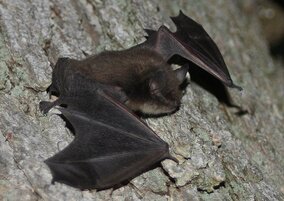CONSERVATION CORNER
A weekly blog for all things conservation
 Little Brown Bat, native to Pennsylvania Little Brown Bat, native to Pennsylvania Excerpt taken from Northcentral Pennsylvania Conservancy (NPC) fall newsletter. To learn more about NPC or to sign up for their newsletter, visit https://npcweb.org/ Halloween is less than a week away and chances are you’ve seen some kind of bat décor on display to complement the “spooky” festivities. It’s probably bats’ nocturnal nature, unique appearance, and folklore affiliations (hint, hint: “I vant to suck your blood”) that have long left bats misunderstood and sometimes even feared. However, bats are actually amazing creatures, vital to our environment. Today, we’re helping to kick off Bat Week 2019 (visit https://batweek.org/ for lots of cool bat info), an annual, international celebration of the role of bats in nature, by sharing 3 reasons why you really should LOVE bats. Reason #1: They help with pest control
Humans shouldn’t fear bats…but do you know who should? Pests! Most bats in North America eat insects, including nocturnal moths, bugs, beetles, flies, and mosquitoes. Many of those insects on the menu are considered agricultural pests. A single bat can eat up to its body weight in insects each night – that’s thousands of insects! Eating all those pests helps lesson crop damage, reduces the use of pesticides, and saves farmers and forest managers billions of dollars each year. Reason #2: They are excellent pollinators Think of it this way, when it comes to pollination, the birds and bees work the dayshift, and when the night shift rolls around it’s time for bats to clock in. While insects are by far the most common diet of bats worldwide, nectar-feeding bats play a critical role as pollinators for a wide variety of plants. For example, in North American deserts, giant cacti and agave depend on bats for pollination. A few other natural resources that heavily rely on bat pollinators include bananas, peaches, cloves, and balsa wood. Reason #3: And they’re great seed dispersers too! Vast amounts of the world’s rainforests are cleared every year for logging, agriculture, and other industrial or urban expansions. In addition, drought, fire, and disease continue to threaten these tropical locations. Regenerating these large, cleared areas of forests is a complex, natural process that relies on a variety of animals to help with seed dispersal. However, since fruit-eating bats disperse seeds from hardier, pioneer plants and can often cover larger distances than other animals, the seeds dropped by bats can account for up to 95 percent of the first new growth! With over 1400 species of bats worldwide, they are essential to not only the natural ecosystems but also global economies. Here in PA, you can find 11 species of bats, all insect-eaters. One of the most common bats you’ve probably seen fluttering about during the evening is the little brown bat. Measuring about 3.5 inches in length, with a wingspan of 9 – 11 inches, this fierce, little hunter is capable of catching 1200 insects per hour. During this time of year, little brown bats leave their summer roosts and move to tunnels, mineshafts and caves. It’s here that they’ll hibernate throughout the winter, and where you’ll find them in their iconic bat pose – clustered together and clinging to the ceiling. Happy Bat Week! …and Happy Halloween! The Bradford County Conservation District is committed to helping people manage resources wisely. You can visit the Bradford County Conservation District at 200 Lake Rd in Wysox across from the Wysox Fire Hall. Contact us at (570) 485-3144 or visit our web page at www.bccdpa.com
0 Comments
Leave a Reply. |
AuthorsVarious staff at the Bradford County Conservation District Archives
July 2024
Categories
All
|
|
Bradford County Conservation District
Stoll Natural Resource Center 200 Lake Road, Suite E | Towanda PA 18848 Phone: (570)-485-3144 |
